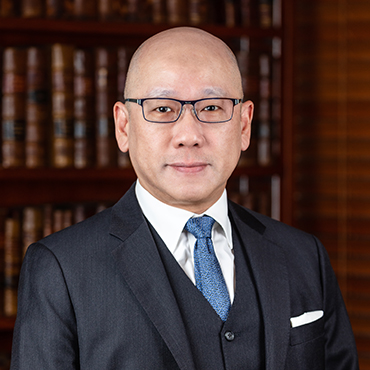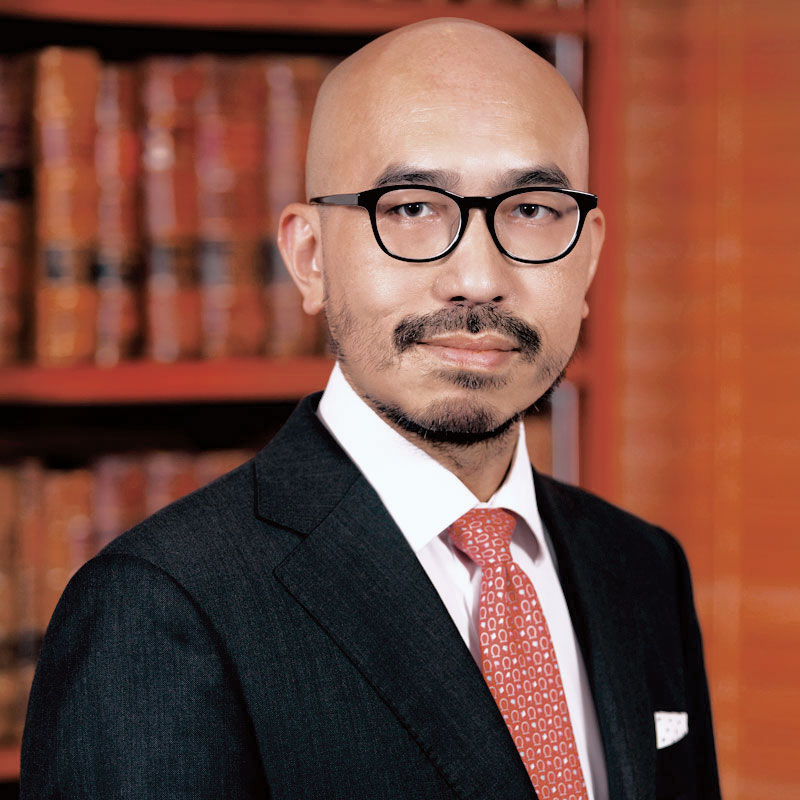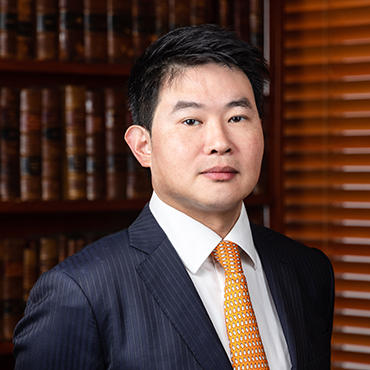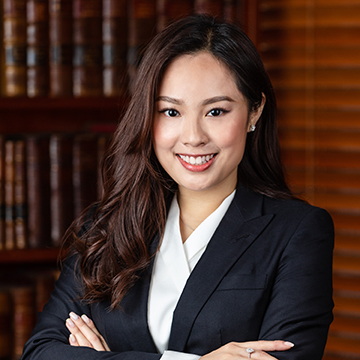HKSAR v Lai Chee Ying (Application for Permanent Stay) [2023] 3 HKLRD 534, [2023] HKCFI 1440 (Robert Pang SC, Steven Kwan, Albert NB Wong, Velda Yau)
Robert Pang SC leading Steven Kwan, Albert NB Wong, Ernie Tung, Colman Li and Velda Yau represented the 1st Defendant in HKSAR and Lai Chee Ying (Application for Permanent Stay) [2023] 3 HKLRD 534, [2023] HKCFI 1440.
L, facing charges including offences under the Law of the People’s Republic of China on Safeguarding National Security (the NSL), applied to the Court of First Instance to permanently stay the criminal proceedings on the basis that allowing the prosecution to continue would be an abuse of process. The trial was to be heard by a panel of three Judges designated under NSL 44. L relied on two grounds, namely: (i) that the process of executive designation of Judges mandated by NSL 44 in the present case was incompatible with the requirements of a fair trial before an independent and impartial tribunal giving rise to apparent bias (Ground 1); and (ii) that the circumvention of rule of law protections by executive authorities in the prosecution of L publicly broke down the constitutionally protected “separation of functions” (Ground 2).
Concerning Ground 2, T, an overseas King’s Counsel, had been granted ad hoc admission by the Chief Judge of the High Court to represent L in his criminal trial. L pointed to subsequent events (as set out at para.73 of this Ruling) including: (i) the interpretation of NSL 14 and NSL 47 (the Interpretation) by the Standing Committee of the National People’s Congress (the NPCSC) on 30 December 2022, as sought by the Chief Executive (the CE) on the same day the Appeal Committee of the Court of Final Appeal refused the Secretary for Justice (the SJ) leave to appeal against T’s admission; and (ii) the decision by the Committee for Safeguarding National Security of the HKSAR (the NSC) on 11 January 2023 that T’s proposed representation of L was contrary to the interests of national security and any future related visa application by T should be refused (the NSC Decision). L submitted that his trial without the public interest of T’s involvement directly undermined the ruling of the Courts concerned exercising superior jurisdiction; and that the relevant events gave rise to a public perception of a deliberate concerted effort by the CE, the SJ, the Director of Immigration and others, to obstruct L from having T as his counsel of choice.
Held, rejecting the application for a permanent stay of proceedings, that:
Ground 1
- (1) This application constituted a systemic attack on trials by designated judges under NSL 44 through the backdoor which was precluded. In any event, none of the “strands” relied on had any merit (HKSAR v Lai Chee Ying (2021) 24 HKCFAR 33 applied). (See paras.41-43, 70.)
- (2) Appointment of judges by the executive did not per se compromise their independence. The wide discretion given to the CE under NSL 44 as to designation of judges was not unfettered as a person could only be so designated if he or she was already a judicial officer or a deputy judge. Regard must be had to s.4 Chapter IV of the Basic Law and the Judicial Officers Recommendation Commission Ordinance (Cap.92) (Kearney v HM Advocate [2006] UKPC D1, Tong Ying Kit v HKSAR [2020] 4 HKLRD 382 applied; Starrs v Ruxton 2000 JC 208, R (Brooke) v Parole Board [2008] 1 WLR 1950 distinguished). (See paras.44-49.)
- (3) L’s complaint that it was not known whether the CE, in designating judges, had regard to their previous judicial decision-making, political or other opinions, affiliations or nationality, was unfounded. The starting point was that professional judges would take their judicial oath seriously and put aside personal inclinations. All judges, designated or not, were subject to the “Guide of Judicial Conduct” with the guiding principles of “independence”, “impartiality” and “integrity and propriety”. Further, judges of foreign nationality were not excluded from designation. (See paras.50-55.)
- (4) While the number of designated judges was not publicly available, in view of the number of judges already designated and given that the assignment of judges for any given case was a matter entirely for the relevant court leaders, it was clearly not the case that the CE could or would manipulate the allocation of trial judges. (See paras.56-57.)
- (5) As for the complaint of secrecy and lack of public accountability of the NSL 44 process, designations were only made from serving judicial officers who were already considered as fit and proper persons to perform judicial function. There could be no challenge to the fact that the present panel was properly designated by the CE. No specifics were given as to how the kind of information sought would assist L or how its absence would prejudice his defence. (See paras.58-60.)
- (6) The submission that designated judges lacked security of tenure was rejected. Even if the designation of a judge under NSL 44 was not renewed or was revoked, the judge still enjoyed the security of tenure guaranteed by the Basic Law. A designation under NSL 44 gave judges no advantage and non-renewal of a term caused no loss. The threshold for revocation was extremely high and would not be satisfied by a judge acting in good faith just because their decision was not favoured by the executive (Tong Ying Kit v HKSAR [2020] 4 HKLRD 382 applied; Starrs v Ruxton 2000 JC 208 distinguished). (See para.61.)
- (7) As to whether NSL 47, which compels judges to seek and accept a determination by the CE whether an act involves national security or evidence involves state secrets if such an issue arises in the course of adjudication, extended the reach of the executive in the adjudicative process, it bore no relation to the issue of designation of judges. That the courts were bound as regards certain matters by a certificate from the executive did not mean the courts may have a bias (Democratic Republic of the Congo v FG Hemisphere Associates LLC (No 2) (2011) 14 HKCFAR 395 applied). (See paras.62-65.)
- (8) Statements attributed to the CE (then the Secretary for Security) at a press conference on 27 June 2021 would not, as argued, give rise to an obvious fear in the mind of a fair-minded observer that designated judges would be biased against L. The statements were only general appeals to the public not to engage in activity which violated national security. If a jury could be trusted not to be affected by newspaper reports which may be prejudicial to the accused, then more could be expected of professional judges (R v Edward Christopher Harris [1991] 1 HKLR 389, HKSAR v Lee Kwok Wah Francis [2013] 2 HKLRD 1009 applied). (See paras.66-69.)
- (9) Even if the Court was wrong in its examination of apparent bias, the application for stay must fail as L did not and could not make a constitutional challenge against NSL 44; the present panel was duly designated under NSL 44; no actual bias was alleged or could be shown; by virtue of NSL 62, the law on apparent bias was now subject to NSL 44 and 46; and if L’s contention was correct, it would mean that L could not be tried by any courts in Hong Kong, which would be contrary to public interests and the legislative intent of the NSL. (See para.71.)
Ground 2
- (10) No case was made out that there had been a collapse of the principle of “separation of functions”; that the Executive had disregarded the ruling of the Court; or there had been an attempt to erode judicial independence. The Court was not satisfied that there had been any abuse of process or affront to the Court’s sense of justice and propriety for reasons including the following: (See para.86.)
- (i) There was not only no actual conflict between the determination of the Appeal Committee and the CE’s subsequent request for an interpretation of the NSL from the NPCSC, but the CE was duty bound to do so. The CE in his dual capacity as head of the HKSAR Government and Chairman of the NSC, was accountable to the Central People’s Government for affairs relating to matters of safeguarding national security (NSL 11 and NSL 12). If the issues about NSL had been properly raised, then they would have been considerations of the highest importance to be taken into account in ad hoc admissions. With the approaching trial dates, it was only proper for the CE to seek an interpretation as a matter of urgency. (See para.77.)
- (ii) Applications for ad hoc admission and immigration control were two separate regimes involving different policies and considerations. The decision of the NSC on any future visa application of T was the subject matter of L’s judicial review proceedings, in which it was held that under NSL 14, the HKSAR courts had no jurisdiction over decisions of the NSC (Lai Chee Ying v Secretary for Justice [2023] 3 HKLRD 275 applied). (See para.80.)
- (iii) With regards to the complaint that the NSC Decision circumvented the procedure of obtaining a certificate under NSL 47, the Interpretation only required the Hong Kong Courts to request and obtain a certificate from the CE under NSL 47 as to whether an act involved national security “when such a question arises in the adjudication of a case concerning an offence endangering national security” (Lai Chee Ying v Secretary for Justice [2023] 3 HKLRD 275 applied). (See para.82.)
- (iv) By the time of the NSC Decision, no practical use could be served for the Court to obtain a certificate from the CE, as the Appeal Committee had already given its determination and the NSC had already obtained the Interpretation. The NSC could not be criticised for complying with the Interpretation and performing its statutory duty, there was no pending sideline employment application from T whose application had already been withdrawn, and no evidence the NSC acted in bad faith. (See para.84.)
- (11) The balance clearly tipped in favour of a trial bearing in mind the seriousness of the alleged offences; that the NSC, in coming to its judgment and the NSC Decision, was acting with the authority bestowed on them under the NSL and there was no evidence of bad faith; the non-absolute nature of L’s right to “choice of counsel” and that T did not have the full right to practice as a barrister in Hong Kong; that L was not left without adequate and competent legal representation; and that L could have a fair trial (Re Simpson QC [2021] 1 HKLRD 715 applied). (See paras.75(2), 87.)
[The above is excerpted from the headnote to the report in HKLRD.]





